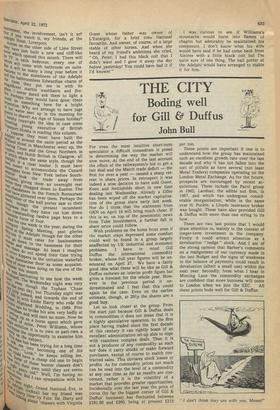THE CITY
Boding well for Gill & Duff us
John Bull
For even the most intuitive short-term speculator a difficult conundrum is posed in determining the way the market will now move. At the end of the last account the effect of the railwaymen's bid to get a fair deal and the March trade deficit — the first for over a year — caused a sharp retreat in share prices. In retrospect it was indeed a wise decision to have sold Guest. Keen and Nettlefolds short in new time dealing last Wednesday. Already a £35m has been wiped off the market capitalisation of the group since early last week. Nor do I think that the statement from GKN on April 19 will bring much cheer. If this is so, on top of the pessimistic news from Tube Investments, a further fall in share price could follow. With problems on the home front even if the market stays depressed some comfort could well be found in a group largely unaffected by UK industrial and economic problems. I have in mind Gill Duffus the international commodity broker, whose full year figures will be announced on April 27. We have a fairly good idea what these will be like as Gill & Duffus eschews an interim profit figure but gives a forecast for the whole year. However in the previous period it underestimated and I feel that this could again be the case. Even on the earlier estimate, though, at 201p the shares are a good buy. Let us look closer at the group. From the start just because Gill & Duffus deals in commodities it does not mean that it is a highly speculative operation. In the first place having traded since the first decade of this century it can rightly boast of an excellent administrative set-up able to cope with countless complex deals. Then it is not a producer of any commodity as such nor does it carry stocks or make forward purchases, except of course to match contracted sales. This obviates stock losses or profits. As for commodity prices not much can be read into the level of a commodity at any one time as far as results are concerned, rather it is the volatility of a market that provides greater opportunities. Incidentally over the last year the price of cocoa (by far the biggest corner of Gill & Duffus' business) has fluctuated between £181.50 and £280, being at present £215 per ton.
These points are important if one is to understand how the group has maintained such an excellent growth rate over the last decade and why it has not fallen into the sort of pitfalls as have several (not least Metal Traders) companies operating on the London Metal Exchange. As for the future, prospects are encouraged by recent acquisitions. These include the Pacol group in 1962, Landuer, the edible nut firm, in 1967, and which has undergone considerable reorganisation, while in the same year H. Puckle, a Lloyds insurance broker was bought. These have also provided Gill & Duffus with more than one string to its bow.
There are two last points that I would draw attention to, mainly in the context of longer-term investment in the company. Firstly it could attract attention as a devaluation " hedge " stock. And I am of the strong opinion that Barber's comments on a realignment of our currency made in the last Budget and the signs of weakness in the balance of payments could result in devaluation (albeit a small one) within the next year. Secondly, from what I hear in Mincing Lane the commodity exchanges are confident that more business will come to London when we join the EEC. All these points bode well for Gill & Duffus.










































 Previous page
Previous page